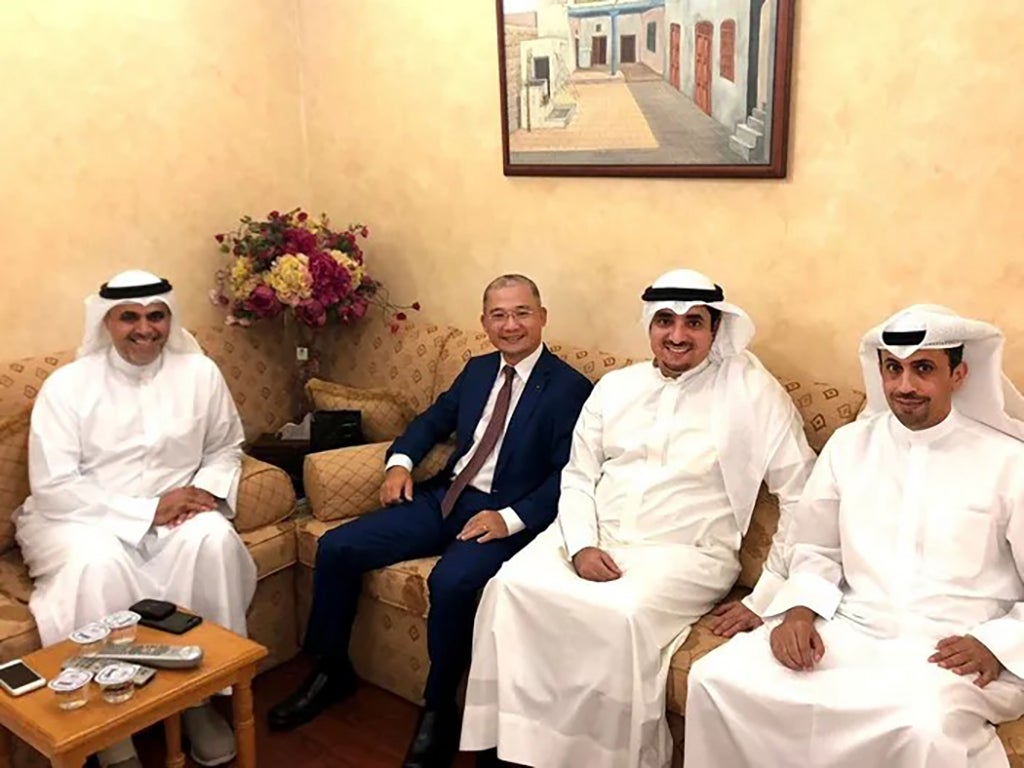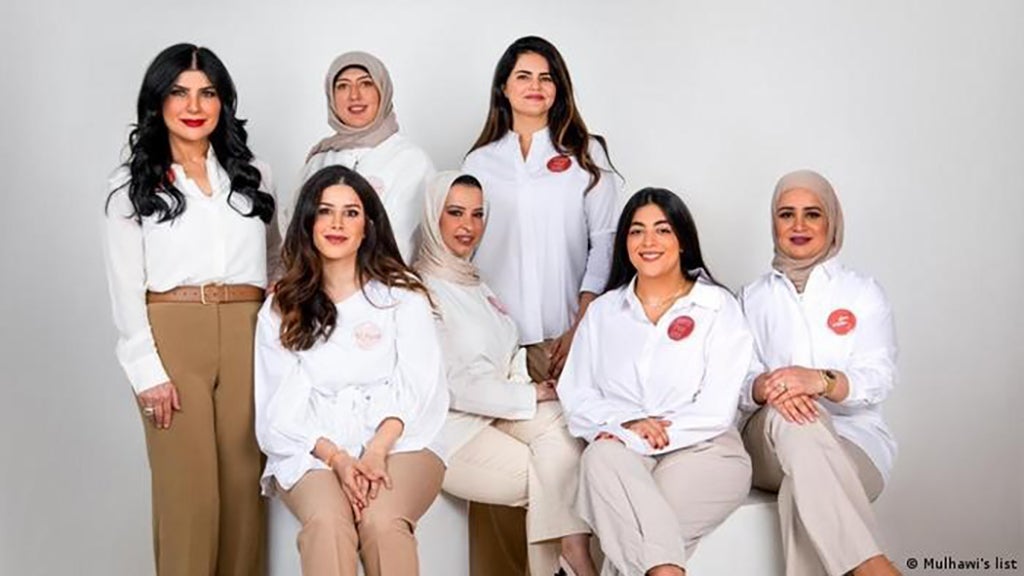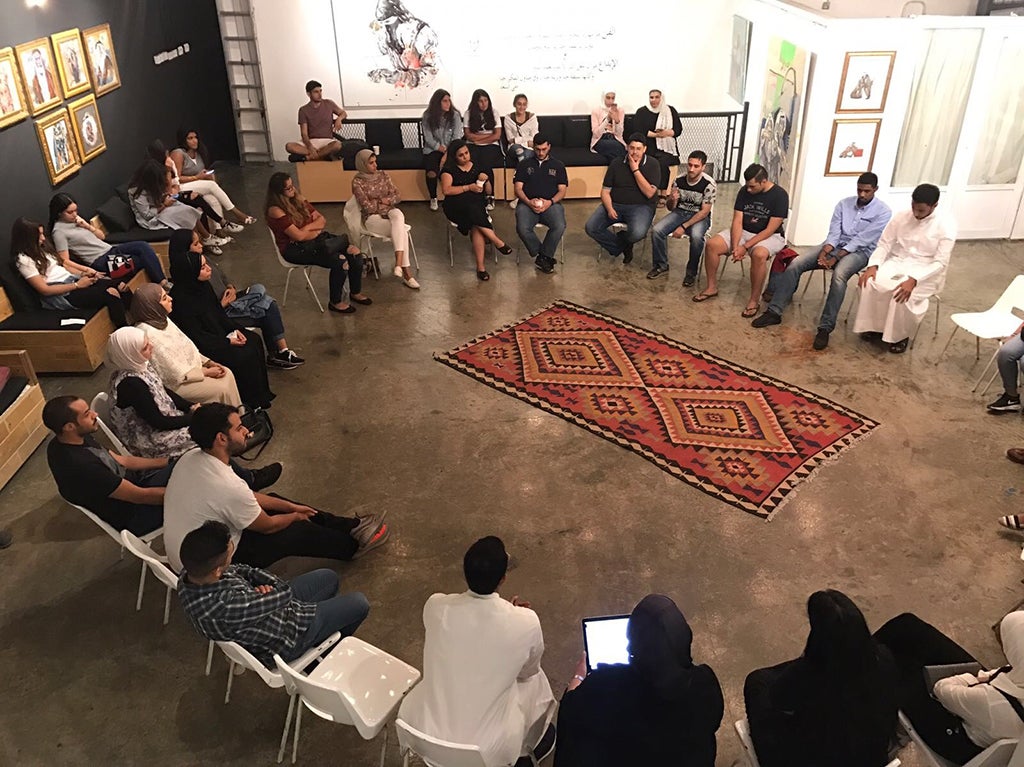Transformation of Diwaniyyas in Post-Covid Kuwait
contributed by Shaun Loh, 9 September 2022

Diplomats from various countries visit diwaniyyas during Ramadan, 2018. Source: Times Kuwait
Diwaniyyas are a fundamental part of Kuwaiti life. They are social gatherings where men congregate physically to discuss issues relevant to them. Previously, they were purely physical spaces. Their influence in Kuwait is not to be understated – these meetings wield the power to change election results. However, the Covid-19 pandemic has accelerated the transformation of the Kuwaiti diwaniyya from one that is traditionally male-dominant and exclusive to one that is online and more open, extending beyond Kuwaiti culture. While this transformation was already underway before the pandemic, the isolation of Kuwaitis during lockdown further hastened the process.
Diwaniyyas are prisms through which we can witness the religious and cultural conventions of Kuwait. Being traditionally exclusive to males, diwaniyyas highlight the patriarchal nature of the state. Even as women were allowed to run for parliament in 2006, they were excluded from the immense social and cultural capital available in diwaniyyas for votes.
Diverse in theme, diwaniyyas range from political to religious, ,even musical. As a majority-Muslim population, Kuwaitis also bring diwaniyyas to another level of festivity and pomp during Ramadan. Some diwaniyas are purpose-built as a villa, with multiple rooms and larger halls for events like Ramadan ghabga feasts (late-night meals after iftar).
As an intern at the Middle East Institute of the National University of Singapore, I previously transcribed an interview with ex-US Ambassador to Kuwait Doug Siliman. He offered his opinion that “Kuwaitis are perhaps the people in the Muslim world who most look forward to Ramadan. In Kuwait, they plan to buy food in advance. They figure out who they want to invite for which nights.”
Upon Covid-19’s arrival on Kuwait’s shores in end-February 2020, Kuwaitis, like the rest of the global community, found their everyday activities transformed by public health regulations. To ensure social and physical distancing, the Kuwait Ministry of Health imposed various health regulations, including a 3-month partial and complete lockdown from March 2020 to May 2020. Most of Kuwaiti society was shut down, including diwaniyyas.
Due to Covid-19 lockdowns, the centrality of diwaniyyas in Kuwait has, however, changed. Most conspicuously is the dwindling of the diwaniyya’s political importance, especially in bolstering the conservative male elite. In the wake of social distancing measures, the Kuwaiti elections migrated online, displacing the usual outreach in diwaniyyas with online meetings and campaigns. Consequently, this new online reality boosted the platforms of opposition-leaning candidates, who won almost 50% of elected seats. By rendering the male-dominated diwaniyya as a space for political campaigns temporarily obsolete, Covid-19 also had the unexpected effect of creating a more even playing field for women’s political participation. In reducing the power of the diwaniyya, Covid-19 has helped to move Kuwait away from its traditional male-dominated political system synonymous with a patriarchal view of Islam. Kuwaiti women only obtained the hard earned right to vote in 2006. Some female politicians (Ghadeer Aseeri) now run their own diwaniyas, which are open to both women and men. With Covid-19 lockdowns, women have been able to obtain greater access to the softer networks and forms of capital that usually circulate at male-exclusive diwaniyyas.

Kuwaiti activists who founded Mulhawi’s List, the first and only platform for women political candidates in Kuwait, 2020. Source: DW
When it came to Ramadan, the primacy of diwaniyyas in celebrations dwindled due to the physical restrictions. During the Holy Month in 2021, Kuwaiti authorities enforced a nationwide curfew running from 7 p.m. to 5 a.m., corresponding to a prohibition of Iftar gatherings during the eating time. In 2022, Iftar gatherings were still banned within mosques. Due to massive campaigns even from the private sector for Kuwaitis to stay home, the previous grandeur of diwaniyya celebrations has toned down after the pandemic started.
Even as diwaniyyas have not completely disappeared, the lockdown accelerated their transition from physical to virtual spaces. This further increased access to diwaniyyas for women and youths. Where diwaniyyas were dominated by older men in parallel with the hierarchical nature of religious leadership, Covid-19 pushed Kuwait out of these mindsets and widened access for youths into diwaniyyas. Long before the pandemic, diwaniyyas were already experiencing a trend of digitization. Kuwaitis of all ages were moving into a digital diwaniya experience through WhatsApp Group chats. Text, photos, videos and voice notes were shared at a fire-rushed pace. However, despite this digital 24/7 connectedness, Kuwaitis were still meeting in person in physical diwaniyas. After Covid-19, more diwaniyyas were forced to enter the digital realm. Not only were more female-only diwaniyyas formed online, but diwaniyyas that were all-inclusive came about. As a state deeply entrenched in a patriarchal view of Islam, Covid-19 reshaped the practice of sex segregation in Kuwait.
The Cross Cultural Diwaniya (CCD) is one example of the renewed diwaniyya make-up. Started out as a recurrent gathering to encourage an open dialogue on various topics across different communities, it sought to empower the wider society with traditional diwaniyyas’ networking and knowledge-sharing advantages.
The social behaviors within diwaniyyas for physical commune can be considered a form of cultural capital transmitted from generation to generation, originating from the old merchants of pre-oil Kuwait society. Passed on from one generation to another, this usage of diwaniyyas has provided immense cultural capital that have sustained the wealth of certain elite Kuwaiti families.
Just as Pierre Bourdieu defines cultural capital as “familiarity with the legitimate culture in a society” applies here, traditional diwaniyyas exhibited familiarising rituals that marked one’s wealth and status. These rituals incorporated etiquette taught in Islam. For instance, youths visiting diwaniyyas would observe rules of modesty such as wearing a floor-length white or cream robe called the dishdasha, or conventions of hierarchy by sitting at a diwaniyya according to seniority. The oldest members sat at the end of the room while the rest arranged across the length of the room in descending order of age.
Through Covid-19’s lifting of the diwaniya out of its physicalities, the rituals of space in diwaniyyas are now rendered far less relevant. Examining the aforementioned Cross Cultural Diwaniyya shown in the picture below, Kuwaitis sit around in circles. Even as many women still observe Islamic fashion conventions like donning the hijab, no Kuwaiti in the diwaniyya is wearing the dishdasha.

Cross Cultural Diwaniyya, 2013. Source: Cross Cultural Diwaniyya Website
Although diwaniyyas are still present in modern-day Kuwait and remain an important social institution, Covid-19 has pushed them further in the trajectory of change. The diwaniyya – a cultural practice of both the Islamic (practices directly linked to the religion itself) and Islamicate (practices specific to Muslim societies but not wholly or directly associated with Islam) – is slowly but surely moving into a more democratic, egalitarian practice.
Religious rituals forming the bedrock of hierarchical and patriarchal conventions in Kuwait are starting to be transformed. Coupled with the rise of digital innovations necessitated by Covid-19 social distancing measures, diwaniyyas reverse from exclusionary spaces to inclusive ones for women and youth in Kuwait. Although Covid-19 has eroded the physicalities of the diwaniyya temporarily, the physical spaces will recover in the new normal. Ultimately, they will not be reinstated fully though. This new amalgamation of physical and digital diwaniyyas is a unique instance of evolution in Kuwait, and will prove important for foreign investors, diplomats and the Kuwaiti government to keep watch.
Disclaimer: The views and opinions expressed in this article are those of the authors and do not necessarily reflect the position of the blog editorial team or the Asia Research Institute.
South Asia | Southeast Asia | East Asia | Other Places | Hinduism | Buddhism | Islam | Christianity | Other Religions
Shaun Loh is a research intern at the Middle East Institute of the National University of Singapore. His research interests lie in the intersections of gender and religion in the Gulf and Iran. His article on Saudi women’s subversion in the economy was previously published in The Common Good, and other articles can be found in the Harvard Singapore Policy Journal and South China Morning Post.

